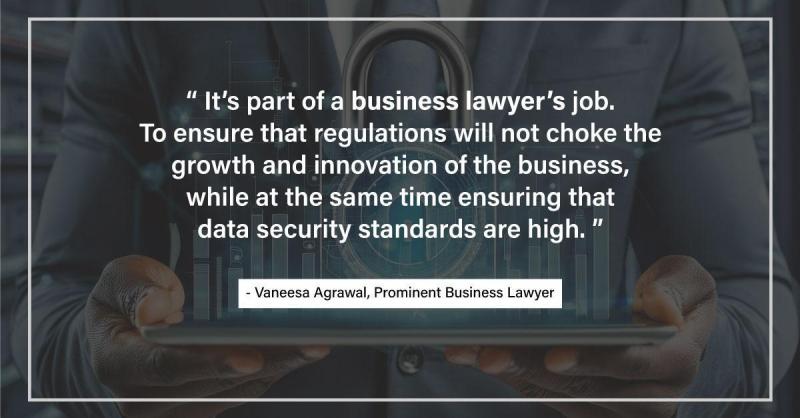Understanding India's Digital Personal Data Protection Act and DPDP Bill, 2023

Data privacy and protection have, in the past decade, gained increased attention worldwide. As such, governments began putting in place stringent legal frameworks. Business lawyers, therefore, are required to support such organisations in order to navigate them through the regulatory maze. Thinking Legal’s article, as contributed by Vaneesa Agrawal, talks about the journey pertaining to this that began with the Personal Data Protection Bill, 2019, which worked at providing a comprehensive data protection regime in India. The Bill came following the landmark verdict by the Supreme Court in 2017, where it stated that the constitutional right to privacy was a fundamental right under the Constitution of India.
Business lawyer Vaneesa Agrawal said, “The proposed legislation contemplated processing personal data in a way that the privacy rights of individuals were protected while ensuring that businesses could operate in a data-driven economy.”
After years of debate and revision, the Personal Data Protection Bill evolved into the Digital Personal Data Protection Act, 2023 (DPDP Act), which was enacted to address the urgent need felt by the modernized data protection framework. Indeed, this has kept business lawyers busy trying to interpret these regulations anew and subsequently advising their clients on ways of compliance.
This article therefore delves into the key features of the Personal Data Protection Bill and DPDP Act India's data protection landscape.
Key Features of the Digital Personal Data Protection Act, 2023
The DPDP Act represents a significant milestone in India's data protection journey. Here are some of its most notable features:
Consent-Based Data Processing
The DPDP Act, for example, requires consent to be obtained in an express and informed manner from the individuals whose personal data is being processed. Companies are turning to business lawyers for advice on how they can add hard-core consent programming that will meet this requirement.
Rights of Individuals
The Act grants several rights to individuals, including the right to access their data, the right to correction, and the right to erasure. Business lawyers highlight that these rights are designed to enhance user autonomy and ensure that individuals can manage their personal information effectively.
Data Fiduciaries and Processors
As per the authorities that carry out the processing of personal data, the date is been characterised as Data Fiduciary and Processor. According to business lawyer Vaneesa Agrawal,grasping these differences is crucial when deciding what an organisation must do under the law.
Data Protection Authority
The DPDP Act establishes the Data Protection Authority of India (DPA) as the regulatory body tasked with overseeing compliance. Business lawyers work towards anticipating how its evolving purview may impact clients. What enforcement strategies might it employ? How stringent will its audits be? These legal experts must ready approaches addressing myriad what-ifs.
Cross-Border Data Transfers
The Act also addresses complex concerns around cross-border data flows. The Act outlines provisions for cross-border data transfers, allowing data to be transferred outside India under certain conditions. In this case, business lawyerswork towards answering questions like,
- What geographic transfers will require review or permitting?
- When does localization make sense?
Vaneesa Agrawal, founder of Thinking Legal adds that this is crucial for businesses operating in a global environment, as it facilitates international data flows while maintaining privacy standards.
Recent Developments and Implications
Since the enactment of the DPDP Act, various stakeholders have been actively discussing its implications and potential challenges. Recent articles have shed light on several key areas:
Business Compliance
Businesses, particularly those in the tech sector, are now faced with the challenge of aligning their operations with the new data protection framework. Compliance with the DPDP Act requires significant changes in data handling practices, including revising privacy policies, implementing robust consent mechanisms, and ensuring data security measures are in place. What business lawyers in this scenario do is they guide through this transition, navigating the complexities of the law and avoiding potential pitfalls.
Regulatory Clarity
The establishment of the DPA is a significant step towards ensuring regulatory clarity in data protection. Business lawyers observe how the DPA will interpret and implement the provisions of the DPDP Act, particularly regarding penalties for non-compliance and the handling of data breaches.
Public Awareness and Education
The success of the DPDP Act hinges on public awareness and understanding of data protection rights. Recent discussions business lawyers emphasise the need for educational initiatives to inform individuals about their rights under the Act.
International Comparisons
As India implements the DPDP Act, business lawyers conduct comparisons with data protection frameworks in other countries, such as the General Data Protection Regulation (GDPR) in the European Union.
Challenges Ahead
Despite the advancement of the DPDP Act, there are a lot of challenges persisting that business lawyers are trying to confront. First of all, implementation and thereby enforcement of the DPDP Act can be done effectively only with huge resources and expertise on the part of organisations. Business lawyers have underscored that there is a greater need for proactive efforts towards compliance in order not to attract possible penalties.
A few critical challenges that are addressed by business lawyers across the country is,
- How to balance innovation in the digital economy with ensuring tight data protection.
- How to maintain this delicate balance considering the impact such changes could have on startups and small businesses that may not be able to compete with compliance matters.
Vaneesa Agrawal highlights that, “It’s part of a business lawyer’s job. To ensure that regulations will not choke the growth and innovation of the business, while at the same time ensuring that data security standards are high.”
Conclusion
The Digital Personal Data Protection Act 2023, marks a pivotal moment in India's journey toward establishing a comprehensive data protection framework. By prioritizing individual rights and imposing clear obligations on businesses, the Act aims to create a safer digital environment for all stakeholders.
As organizations work to comply with the new regulations, the work of business lawyers becomes increasingly vital in navigating the complexities of data protection law.






Comments